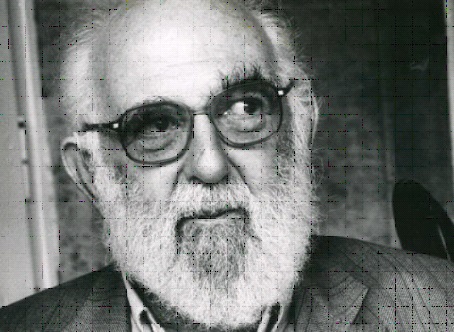Ronald (Ronnie) Jonas Frankenberg, 1929 – 2015
By the time Ronnie, as he was universally and affectionately known, died on 20 November 2015, he was one of most widely acknowledged figures in British social anthropology.
As an undergraduate at Cambridge in science, he made a dramatic turnaround and undertook archaeology and anthropology. This was largely due to the influence of Max Gluckman. Ronnie subsequently followed Max Gluckman to Manchester where he completed his Master’s degree, then his PhD. His originally intended fieldwork site in the Caribbean proved impossible due to his well-known communist sympathies. Instead he undertook fieldwork for his PhD in Britain, almost unique for the time. This was conducted in the former slate mining community of Glyn Ceiriog in Denbighshire, where Ronnie documented complexities and conflicts in a radically different view of small community life to that prevalent at that time. His left-wing sympathies were profoundly strengthened by this research, which was published as Village on the Border (1957). A spell as Education Officer for the National Union of Mineworkers (South Wales area) 1957-60 was followed by a period at the University of Zambia, then a post in social sciences at Keele University. There he became the inaugural Professor of Sociology, as a result of his long-standing interests in social and gender inequality and his role and training in anthropology. His second book Communities in Britain (1966) consolidated his views on the difference between urban and rural lives. It predated the great flowering of community and community power studies of the late 1960s and early 1970s.

RAI 39784 Portrait of Ronnie Frankenberg photographed by Jochen Resch, c. 1990s ©RAI
At Keele, Ronnie melded the two disciplines of sociology and anthropology. He capitalised on the common student protests of the early 1970s, giving students roles in developing the curriculum, whilst pursuing his own interests in science and technology studies, visual culture, and the sociology and anthropology of time. His lengthy editorship of the Sociological Review from 1970-1994 turned this into an unusual interdisciplinary forum, substantially different in style from more conventional sociological journals. During this period, he held visiting posts at the University of California, and Case Western Reserve, and undertook limited fieldwork in Tuscany. This was followed by his retirement from Keele. As Professor Emeritus there from 1995, he retained a part-time teaching role, and established a Centre for Medical Anthropology.
Following Ronnie’s re-focus on medical anthropology, Adam Kuper persuaded him to also teach part-time at Brunel. Together with Cecil Helman, Ronnie established the first taught Master’s degree in Medical Anthropology in Europe in 1989. This was followed by a Masters at Keele, and other UK institutions. Ronnie was also awarded the title of Professor Associate of Medical Anthropology at Brunel. Ronnie’s move to Brunel proved intellectually liberating. It allowed him to focus his energies on his long-standing vision of, and for medical anthropology, and to develop cognate interests in the anthropology of the body in its broadest context. As always, he read and studied voraciously, and wrote prolifically. His ideas were always developing as he sought to incorporate the most recent anthropological ideas into his work. Unfortunately much of his extensive writing remains unpublished, although almost all of it was presented at conferences. As a teacher he also excelled. Constantly reflecting on innovative approaches to cultural life, he worked with many brilliant students amongst those who completed Brunel’s Masters degree between 1989-2000. His graduate students recognised him as an unusual, exceptional scholar. Brunel University awarded him an honorary DSocSci in 1999 in recognition of his achievements in medical anthropology. This followed his achievement of the Bronislaw Malinowski Award of the US Society for Applied Anthropology in 1993 for a lifetime commitment of the application of social science to contemporary issues—the only UK recipient other than Raymond Firth.
Ronnie was an inveterate invitee to anthropological conferences, on both sides of the Atlantic, and made seminal contributions from the podium and floor. Through his presence at conferences his latest work became widely known. He became greatly respected by many key figures in both UK and US medical anthropology– as well as senior figures in British medical sociology, and others working on social and gender inequality. Towards the end of his life, he became intensely interested in studying his Jewish heritage, and all aspects of Jewish history and life. Undoubtedly this process contributed to his son Adam’s choice to train as a Rabbi.
Ronnie was born in London, the son of Louis, and Sarah (née Zaions), and attended Highgate School before he went to Cambridge. His brother was an eminent physician. Ronnie’s niece, born Joyce Frankenberg, became a celebrated Hollywood actress (under the name of Jane Seymour). In 1953 he married Alison Sherrat. They had two daughters, Ruth and Rose-Anna. Following their divorce he married Joyce Leeson in 1964. They had one child, Helen. His married his third wife, Pauline, in 1977, and they had two children Adam and Rebecca. His daughter Ruth, an internationally known sociologist of gender, died in 2007. He is survived by his third wife Pauline and his other children.
IAN ROBINSON
Also see:
Savage, Mike. 2016. “Ronald Frankenberg obituary”. The Guardian, 4 January.
http://www.theguardian.com/science/2016/jan/04/ronald-frankenberg
To cite this article:
ROBINSON, IAN. 2016. ‘Ronald (Ronnie) Jonas Frankenberg’. Obituaries. Royal Anthropological Institute, 14 January 2016. (available on-line: http://www.therai.org.uk/archives-and-manuscripts/obituaries/ronnie-frankenberg).
Link to relevant records by or concerning the listed person on the RAI’s bibliographic database Anthropological Index Online https://aio.therai.org.uk/aio.php?action=doquicksearch&qs_resultsmode=bib&pager_resid=0c12d3872156deab038566d7747a3f2f&pager_pagenumber=0
